Unit 4 Don't eat in class. Section B (2a~2c) 课件 (共30张PPT) 2023-2024学年人教版英语七年级下册
文档属性
| 名称 | Unit 4 Don't eat in class. Section B (2a~2c) 课件 (共30张PPT) 2023-2024学年人教版英语七年级下册 | 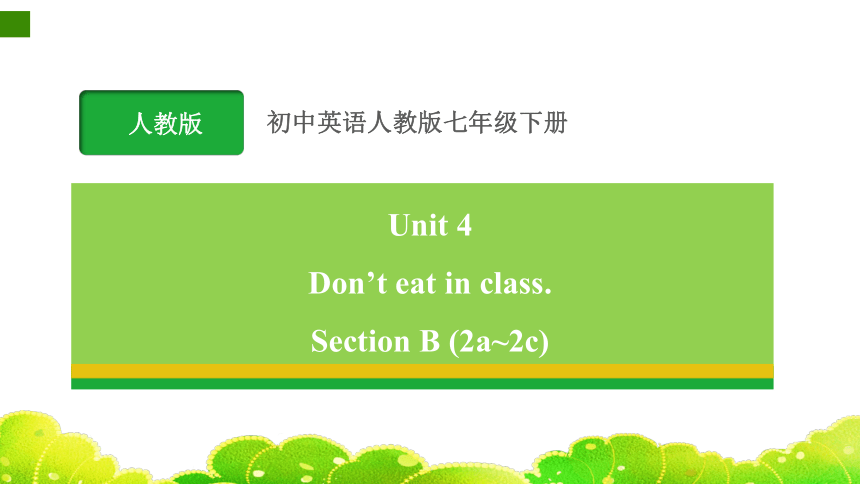 | |
| 格式 | pptx | ||
| 文件大小 | 3.5MB | ||
| 资源类型 | 教案 | ||
| 版本资源 | 人教新目标(Go for it)版 | ||
| 科目 | 英语 | ||
| 更新时间 | 2024-01-01 20:11:07 | ||
图片预览

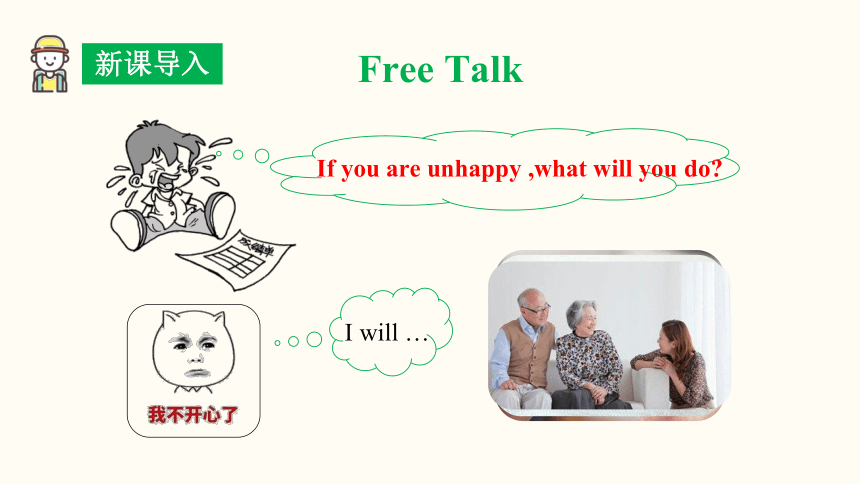
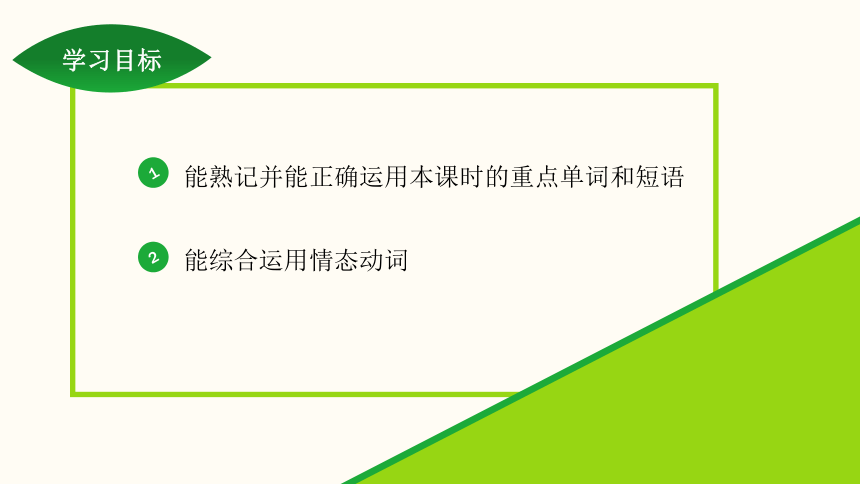
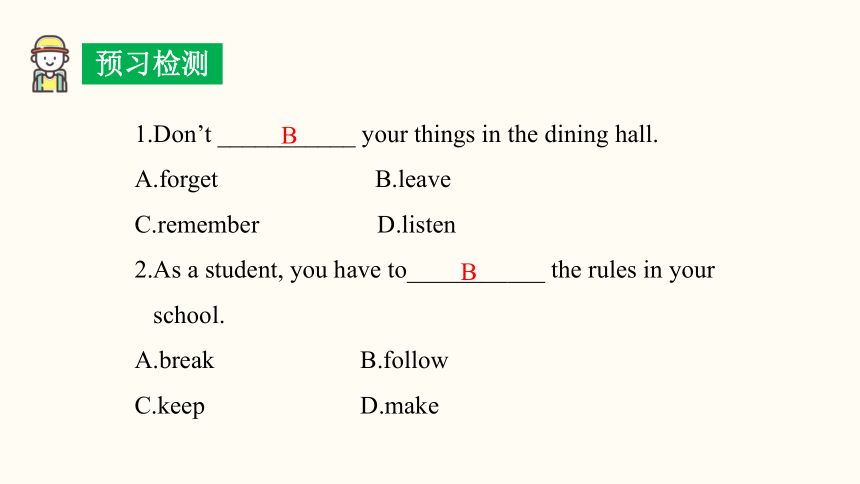
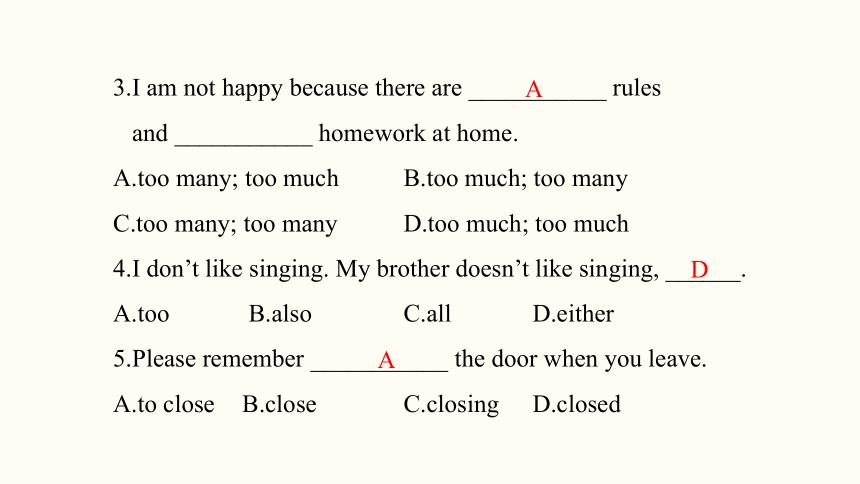
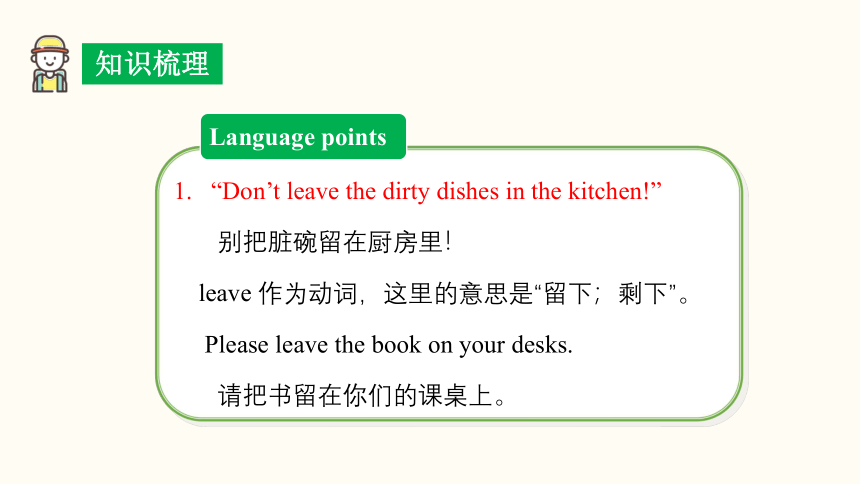
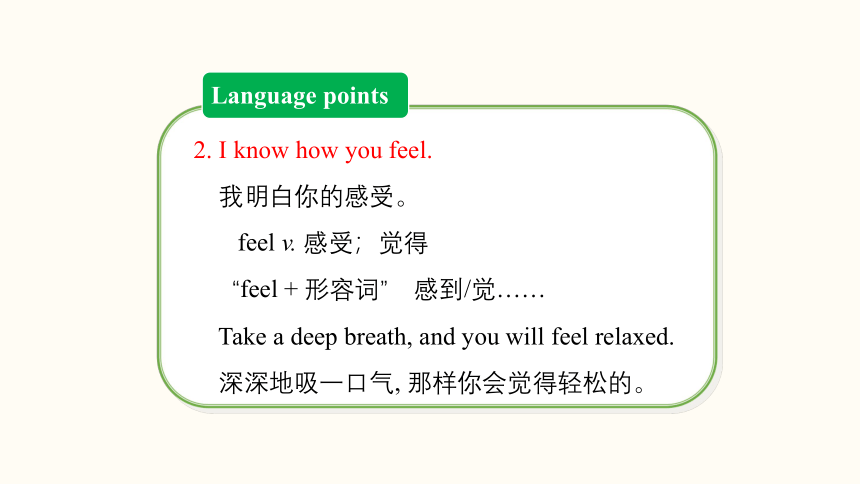
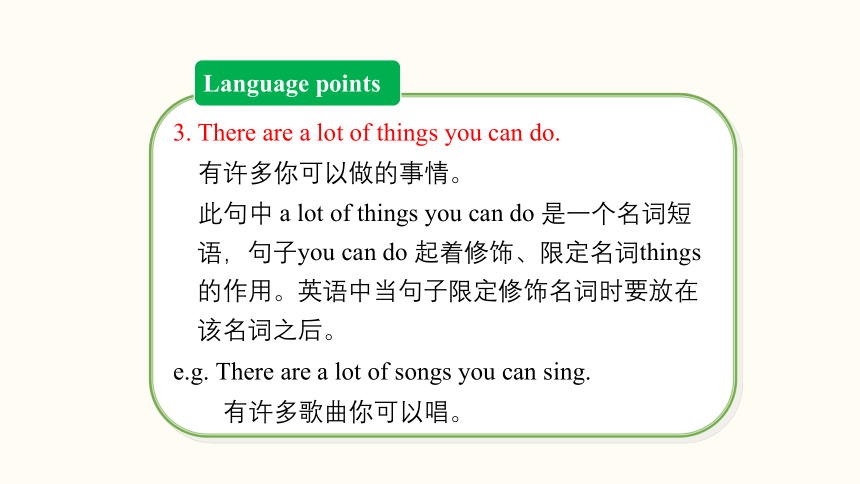
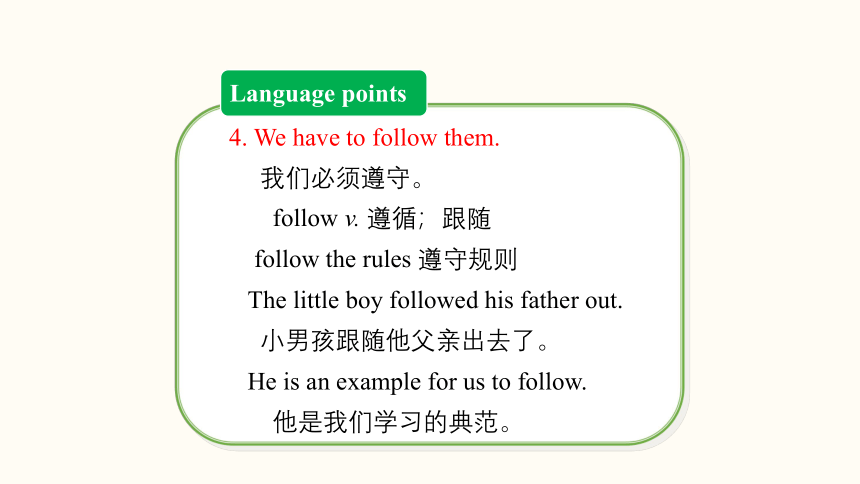
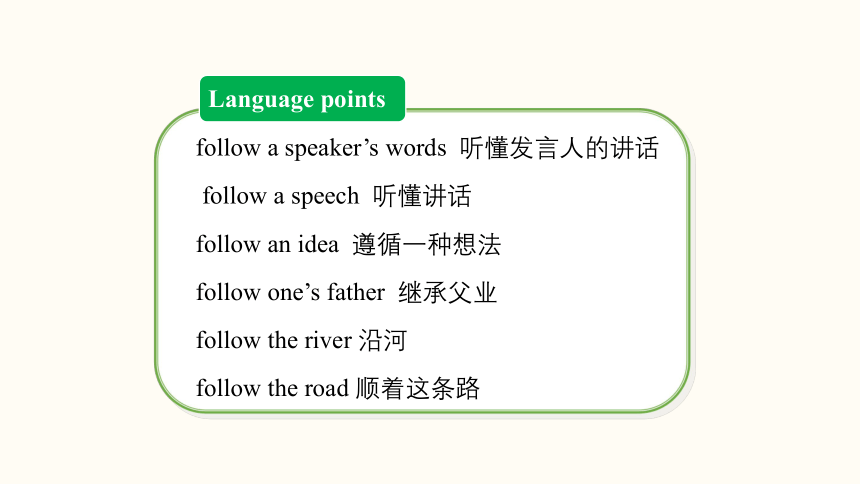
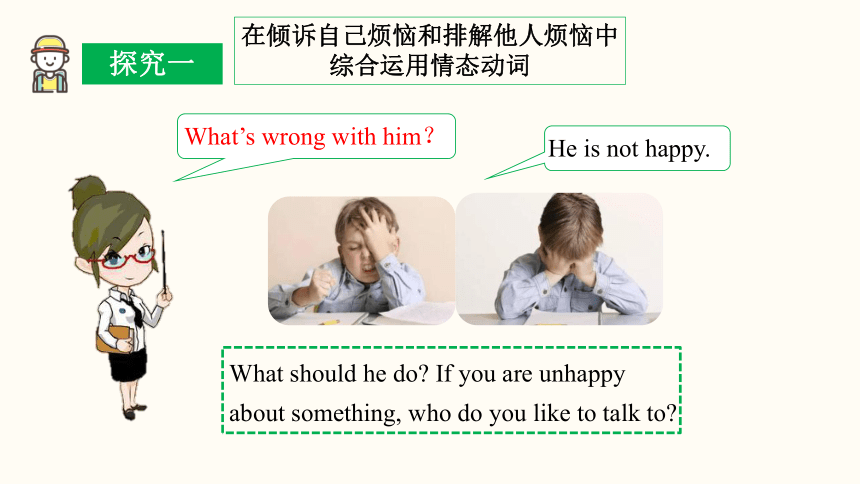
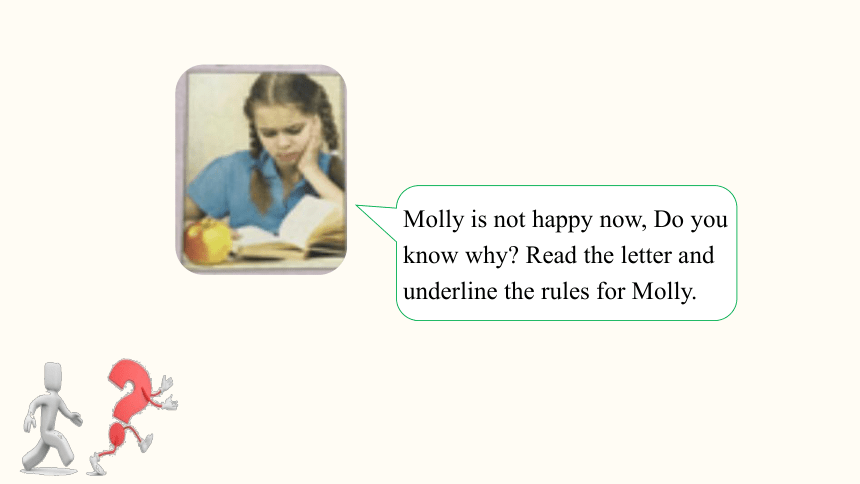
文档简介
(共30张PPT)
Unit 4
Don’t eat in class.
Section B (2a~2c)
新课导入
Free Talk
If you are unhappy ,what will you do
I will …
1
2
能熟记并能正确运用本课时的重点单词和短语
能综合运用情态动词
预习检测
1.Don’t ___________ your things in the dining hall.
A.forget B.leave
C.remember D.listen
2.As a student, you have to___________ the rules in your
school.
A.break B.follow
C.keep D.make
B
B
3.I am not happy because there are ___________ rules
and ___________ homework at home.
A.too many; too much B.too much; too many
C.too many; too many D.too much; too much
4.I don’t like singing. My brother doesn’t like singing, ______.
A.too B.also C.all D.either
5.Please remember ___________ the door when you leave.
A.to close B.close C.closing D.closed
A
D
A
知识梳理
Language points
1. “Don’t leave the dirty dishes in the kitchen!”
别把脏碗留在厨房里!
leave 作为动词,这里的意思是“留下;剩下”。
Please leave the book on your desks.
请把书留在你们的课桌上。
Language points
2. I know how you feel.
我明白你的感受。
feel v. 感受;觉得
“feel + 形容词” 感到/觉……
Take a deep breath, and you will feel relaxed.
深深地吸一口气, 那样你会觉得轻松的。
Language points
3. There are a lot of things you can do.
有许多你可以做的事情。
此句中 a lot of things you can do 是一个名词短语,句子you can do 起着修饰、限定名词things 的作用。英语中当句子限定修饰名词时要放在该名词之后。
e.g. There are a lot of songs you can sing.
有许多歌曲你可以唱。
Language points
4. We have to follow them.
我们必须遵守。
follow v. 遵循;跟随
follow the rules 遵守规则
The little boy followed his father out.
小男孩跟随他父亲出去了。
He is an example for us to follow.
他是我们学习的典范。
Language points
follow a speaker’s words 听懂发言人的讲话
follow a speech 听懂讲话
follow an idea 遵循一种想法
follow one’s father 继承父业
follow the river 沿河
follow the road 顺着这条路
探究一
在倾诉自己烦恼和排解他人烦恼中
综合运用情态动词
What’s wrong with him?
He is not happy.
What should he do If you are unhappy about something, who do you like to talk to
Molly is not happy now, Do you know why Read the letter and underline the rules for Molly.
Group work
The rules for Molly
Dear Dr. Know,
There are too many rules! At 6:00 a.m., my mom says, “Get up now and make your bed!” After breakfast, my mom always says, “Don’t leave the dirty dishes in the kitchen!” After that, I run to school because I can’t be late. At school, we have more rules— don’t be noisy, don’t eat in class,…
My dad says I can’t play basketball after school because I must do my homework. I can play only on weekends. After dinner, I can’t relax either. I must read a book before I can watch TV. But I have to go to bed before 10:00. Rules, rules, rules! It’s terrible! What can I do, Dr. Know
Molly Brown, New York.
根据上述方法请同学们仔细阅读回信,在书本上画出含有情态动词的句子。独立完成后并分享。
提出你认为较难理解的句子。
After dinner, I can’t relax either.
晚餐后,我也无法放松。
观察比较并探讨下列句子的区别。
I don’t like bananas. He doesn’t like bananas, ______.
I’ll go to see the film, _______.
either
too
too 是普通用词,多用于口语,语气较随便。一般用在肯定句中,放在句末。
I'm in Row 1, too.
either 表示“也”时,一般只用于否定句,且置于
句末。
I don't know him. Tom doesn't know him, either.
If you don't go there, he won't go there, either.
2c Read the letters again. Complete the sentences
with have to/must, can or can't.
1. Molly _____ play basketball on school days, but she ___ play it on weekends.
2. Molly _____ do her homework first when she gets home.
3. Molly _____ read a book after dinner before she _____ watch TV.
can’t
can
must
must
can
4. At school, Molly ____ be noisy or eat in class.
5. Parents and schools make rules to help students. So students ______ follow the rules.
can’t
have to
Group work
面对诸多的家规、校规,我们应该怎么做,在小组内讨论并分享。
当堂检测见DCF课件
活动小结
情态动词can,can't,must,have to均可用来表达规则,can意思是__________,否定形式是________,must表示________________,have to表示_____________________
能、可以
can't
主观上必须做的事
客观上必须做的事
探究二
重点短语
“火眼金睛”
请同学们找出本课时中所学过的短语
be strict with/be strict in
too many/too much
follow the rules/make the rules
请同学们翻译下列句子并分析它们之间的区别。
He has too many friends to meet.
We have too much work to do.
My English teacher is strict with us.
He is strict in his work.
Most of the students can follow the school rules.
My parents make a lot of rules for me to follow.
be strict with/be strict in
be strict with后一般接sb.意为“对某人要求严格”
be strict in后一般接sth.意为“对某事要求严格”
e.g. My mother is strict with me and in my study.
我妈妈对我以及我的学习要求严格。
too many/too much
too many意为“太多”,其后接可数名词的复数形式。
e.g. There are too many people in the supermarket.
超市里的人太多了。
too much意为“太多”,其后接不可数名词;
还可作状语修饰动词。
e.g. I have too much homework this evening.
今天晚上我有太多的家庭作业了。
He talks too much.他说得太多了。
follow the rules/make the rules
follow the rules 遵守规则
make the rules 制定规则
e.g. I don't make the rules, I just follow the rules.
我不是制定规则,我只是遵从规则。
“你点我说”
一名学生随机抽出一个短语,另一个学生造句并抽出下一个短语。
be strict with
……
too many
We should be strict with ourselves.
当堂检测见DCF课件
活动小结
通过以上的活动,我们可以知道,too many和too much都可以表示1._______之意,前者用来修饰2.___________________,后者修饰3.__________; 4.______________表示“对某人要求严格”,5._____________则表示“对某事要求严格”;“制定规则”的英语为6.______________,“遵守规则”的英语为7._______________。
太多的
可数名词的复数形式
不可数名词
be strict with sb.
be strict in sth.
make the rules
follow the rules
当堂检测
根据句意及汉语提示写单词。
1. Tom wants to make (更多的)friends.
2. The hallways are always (吵闹的)between classes.
3. After that,you can (放松)for half an hour.
4. Many people think red can bring them good (运气).
5. We must (遵守)the school rules.
more
noisy
relax
luck
follow
课堂总结
too和either的区别
重点短语辨析:
be strict with/be strict in;
too many/too much;
follow the rules/make the rules
Unit 4
Section B (2a~2c)
Unit 4
Don’t eat in class.
Section B (2a~2c)
新课导入
Free Talk
If you are unhappy ,what will you do
I will …
1
2
能熟记并能正确运用本课时的重点单词和短语
能综合运用情态动词
预习检测
1.Don’t ___________ your things in the dining hall.
A.forget B.leave
C.remember D.listen
2.As a student, you have to___________ the rules in your
school.
A.break B.follow
C.keep D.make
B
B
3.I am not happy because there are ___________ rules
and ___________ homework at home.
A.too many; too much B.too much; too many
C.too many; too many D.too much; too much
4.I don’t like singing. My brother doesn’t like singing, ______.
A.too B.also C.all D.either
5.Please remember ___________ the door when you leave.
A.to close B.close C.closing D.closed
A
D
A
知识梳理
Language points
1. “Don’t leave the dirty dishes in the kitchen!”
别把脏碗留在厨房里!
leave 作为动词,这里的意思是“留下;剩下”。
Please leave the book on your desks.
请把书留在你们的课桌上。
Language points
2. I know how you feel.
我明白你的感受。
feel v. 感受;觉得
“feel + 形容词” 感到/觉……
Take a deep breath, and you will feel relaxed.
深深地吸一口气, 那样你会觉得轻松的。
Language points
3. There are a lot of things you can do.
有许多你可以做的事情。
此句中 a lot of things you can do 是一个名词短语,句子you can do 起着修饰、限定名词things 的作用。英语中当句子限定修饰名词时要放在该名词之后。
e.g. There are a lot of songs you can sing.
有许多歌曲你可以唱。
Language points
4. We have to follow them.
我们必须遵守。
follow v. 遵循;跟随
follow the rules 遵守规则
The little boy followed his father out.
小男孩跟随他父亲出去了。
He is an example for us to follow.
他是我们学习的典范。
Language points
follow a speaker’s words 听懂发言人的讲话
follow a speech 听懂讲话
follow an idea 遵循一种想法
follow one’s father 继承父业
follow the river 沿河
follow the road 顺着这条路
探究一
在倾诉自己烦恼和排解他人烦恼中
综合运用情态动词
What’s wrong with him?
He is not happy.
What should he do If you are unhappy about something, who do you like to talk to
Molly is not happy now, Do you know why Read the letter and underline the rules for Molly.
Group work
The rules for Molly
Dear Dr. Know,
There are too many rules! At 6:00 a.m., my mom says, “Get up now and make your bed!” After breakfast, my mom always says, “Don’t leave the dirty dishes in the kitchen!” After that, I run to school because I can’t be late. At school, we have more rules— don’t be noisy, don’t eat in class,…
My dad says I can’t play basketball after school because I must do my homework. I can play only on weekends. After dinner, I can’t relax either. I must read a book before I can watch TV. But I have to go to bed before 10:00. Rules, rules, rules! It’s terrible! What can I do, Dr. Know
Molly Brown, New York.
根据上述方法请同学们仔细阅读回信,在书本上画出含有情态动词的句子。独立完成后并分享。
提出你认为较难理解的句子。
After dinner, I can’t relax either.
晚餐后,我也无法放松。
观察比较并探讨下列句子的区别。
I don’t like bananas. He doesn’t like bananas, ______.
I’ll go to see the film, _______.
either
too
too 是普通用词,多用于口语,语气较随便。一般用在肯定句中,放在句末。
I'm in Row 1, too.
either 表示“也”时,一般只用于否定句,且置于
句末。
I don't know him. Tom doesn't know him, either.
If you don't go there, he won't go there, either.
2c Read the letters again. Complete the sentences
with have to/must, can or can't.
1. Molly _____ play basketball on school days, but she ___ play it on weekends.
2. Molly _____ do her homework first when she gets home.
3. Molly _____ read a book after dinner before she _____ watch TV.
can’t
can
must
must
can
4. At school, Molly ____ be noisy or eat in class.
5. Parents and schools make rules to help students. So students ______ follow the rules.
can’t
have to
Group work
面对诸多的家规、校规,我们应该怎么做,在小组内讨论并分享。
当堂检测见DCF课件
活动小结
情态动词can,can't,must,have to均可用来表达规则,can意思是__________,否定形式是________,must表示________________,have to表示_____________________
能、可以
can't
主观上必须做的事
客观上必须做的事
探究二
重点短语
“火眼金睛”
请同学们找出本课时中所学过的短语
be strict with/be strict in
too many/too much
follow the rules/make the rules
请同学们翻译下列句子并分析它们之间的区别。
He has too many friends to meet.
We have too much work to do.
My English teacher is strict with us.
He is strict in his work.
Most of the students can follow the school rules.
My parents make a lot of rules for me to follow.
be strict with/be strict in
be strict with后一般接sb.意为“对某人要求严格”
be strict in后一般接sth.意为“对某事要求严格”
e.g. My mother is strict with me and in my study.
我妈妈对我以及我的学习要求严格。
too many/too much
too many意为“太多”,其后接可数名词的复数形式。
e.g. There are too many people in the supermarket.
超市里的人太多了。
too much意为“太多”,其后接不可数名词;
还可作状语修饰动词。
e.g. I have too much homework this evening.
今天晚上我有太多的家庭作业了。
He talks too much.他说得太多了。
follow the rules/make the rules
follow the rules 遵守规则
make the rules 制定规则
e.g. I don't make the rules, I just follow the rules.
我不是制定规则,我只是遵从规则。
“你点我说”
一名学生随机抽出一个短语,另一个学生造句并抽出下一个短语。
be strict with
……
too many
We should be strict with ourselves.
当堂检测见DCF课件
活动小结
通过以上的活动,我们可以知道,too many和too much都可以表示1._______之意,前者用来修饰2.___________________,后者修饰3.__________; 4.______________表示“对某人要求严格”,5._____________则表示“对某事要求严格”;“制定规则”的英语为6.______________,“遵守规则”的英语为7._______________。
太多的
可数名词的复数形式
不可数名词
be strict with sb.
be strict in sth.
make the rules
follow the rules
当堂检测
根据句意及汉语提示写单词。
1. Tom wants to make (更多的)friends.
2. The hallways are always (吵闹的)between classes.
3. After that,you can (放松)for half an hour.
4. Many people think red can bring them good (运气).
5. We must (遵守)the school rules.
more
noisy
relax
luck
follow
课堂总结
too和either的区别
重点短语辨析:
be strict with/be strict in;
too many/too much;
follow the rules/make the rules
Unit 4
Section B (2a~2c)
同课章节目录
- Unit 1 Can you play the guitar?
- Section A
- Section B
- Unit 2 What time do you go to school?
- Section A
- Section B
- Unit 3 How do you get to school?
- Section A
- Section B
- Unit 4 Don't eat in class.
- Section A
- Section B
- Unit 5 Why do you like pandas?
- Section A
- Section B
- Unit 6 I'm watching TV.
- Section A
- Section B
- Review of Units 1-6
- Unit 7 It's raining!
- Section A
- Section B
- Unit 8 Is there a post office near here?
- Section A
- Section B
- Unit 9 What does he look like?
- Section A
- Section B
- Unit 10 I'd like some noodles.
- Section A
- Section B
- Unit 11 How was your school trip?
- Section A
- Section B
- Unit 12 What did you do last weekend?
- Section A
- Section B
